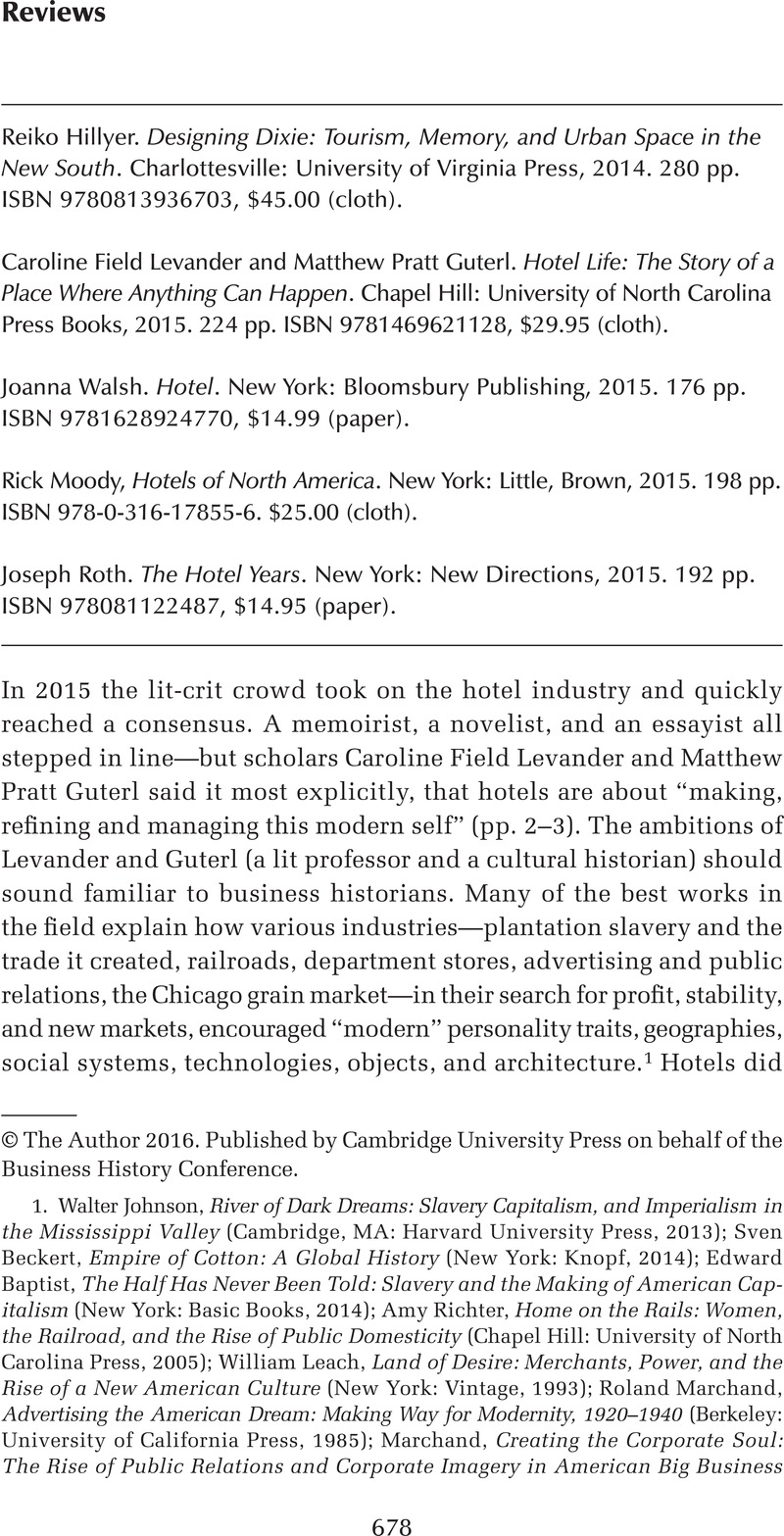No CrossRef data available.
Article contents
Reiko Hillyer. Designing Dixie: Tourism, Memory, and Urban Space in the New South. Charlottesville: University of Virginia Press, 2014. 280 pp. ISBN 9780813936703, $45.00 (cloth). - Caroline Field Levander and Matthew Pratt Guterl. Hotel Life: The Story of a Place Where Anything Can Happen. Chapel Hill: University of North Carolina Press Books, 2015. 224 pp. ISBN 9781469621128, $29.95 (cloth). - Joanna Walsh. Hotel. New York: Bloomsbury Publishing, 2015. 176 pp. ISBN 9781628924770, $14.99 (paper). - Rick Moody, Hotels of North America. New York: Little, Brown, 2015. 198 pp. ISBN 978-0-316-17855-6. $25.00 (cloth). - Joseph Roth. The Hotel Years. New York: New Directions, 2015. 192 pp. ISBN 978081122487, $14.95 (paper).
Published online by Cambridge University Press: 10 May 2016
Abstract

- Type
- Book Review Essay
- Information
- Copyright
- Copyright © The Author 2016. Published by Cambridge University Press on behalf of the Business History Conference. All rights reserved.
References
1. Walter Johnson, River of Dark Dreams: Slavery Capitalism, and Imperialism in the Mississippi Valley (Cambridge, MA: Harvard University Press, 2013); Sven Beckert, Empire of Cotton: A Global History (New York: Knopf, 2014); Edward Baptist, The Half Has Never Been Told: Slavery and the Making of American Capitalism (New York: Basic Books, 2014); Amy Richter, Home on the Rails: Women, the Railroad, and the Rise of Public Domesticity (Chapel Hill: University of North Carolina Press, 2005); William Leach, Land of Desire: Merchants, Power, and the Rise of a New American Culture (New York: Vintage, 1993); Roland Marchand, Advertising the American Dream: Making Way for Modernity, 1920–1940 (Berkeley: University of California Press, 1985); Marchand, Creating the Corporate Soul: The Rise of Public Relations and Corporate Imagery in American Big Business (Berkeley: University of California Press, 1998); Pamela Walker Laird: Advertising Progress: American Business and the Rise of Consumer Marketing (Baltimore, MD: Johns Hopkins University Press, 1998); William Cronon, Nature’s Metropolis: Chicago and the Great West (New York: W. W. Norton and Company, 1991).
2. A. K. Sandoval-Strausz, Hotel: An American History (New Haven, CT: Yale University Press, 2007); Molly Berger, Hotel Dreams: Luxury, Technology, and Urban Ambition in America, 1829–1929 (Baltimore, MD: Johns Hopkins University Press, 2011); Annabel Jane Wharton, Building the Cold War: Hilton International Hotels and Modern Architecture (Chicago: University of Chicago Press, 2001). See also Norman Hayner, Hotel Life (Chapel Hill: University of North Carolina Press, 1936); Paul Groth, Living Downtown: The History of Residential Hotels in the United States (Berkeley: University of California Press, 1994); Rachel Sherman, Class Acts: Service and Inequality in Luxury Hotels (Berkeley: University of California Press, 2007); Wayne Koestenbaum, Hotel Theory (New York: Soft Skull Press, 2007).
3. Philip Scranton and Janet F. Davidson, The Business of Tourism: Place, Faith, and History (Philadelphia: University of Pennsylvania Press, 2007).
4. Hillyer is not entirely alone in this new interpretation of some tourism as nakedly pro-development—she cites other work making similar arguments about tourism in the American West by Lawrence Culver, Phoebe Kropp, Hal Rothman, and Marguerite Shaffer—but hers is still a minority view and previously unexplored, as far as I know, in histories of tourism in the American South. Lawrence Culver, The Frontier of Leisure: Southern California and the Shaping of Modern America (New York: Oxford University Press, 2010); Phoebe Kropp, California Vieja: Culture and Memory in a Modern Place (Berkeley: University of California Press, 2008); Hal Rothman, Devil’s Bargains: Tourism in the Twentieth-Century American West (Lawrence: University Press of Kansas, 1998); Marguerite Shaffer, See America First: Tourism and National Identity, 1880-1940 (Washington, DC: Smithsonian Institution Press, 2001).
5. Nina Silber, The Romance of Reunion: Northerners and the South, 1865–1900 (Chapel Hill: University of North Carolina Press, 1997); David W. Blight, Race and Reunion: The Civil War in American Memory (New York: Belknap Press, 2001).
6. Alan Trachtenberg, The Incorporation of America: Culture and Society in the Gilded Age (New York: Hill and Wang, 1982); E. P. Thompson, “Time, Work–Discipline, and Industrial Capitalism,” Past and Present (1967): 56–97; David Harvey, The Condition of Postmodernity (Oxford: Blackwell, 1989).
7. D. M. Thomas, The White Hotel (New York: Viking, 1981).
8. Berger, Hotel Dreams; Carolyn E. Brucken, “Consuming Luxury: Hotels and the Rise of Middle-Class Public Space, 1825–1860,” PhD diss., George Washington University, 1997.
9. Susan Porter Benson, Counter Cultures: Saleswomen, Managers, and Customers in American Department Stores, 1890–1940 (Urbana: University of Illinois Press, 1987).
10. Arlie Hochschild, The Managed Heart: Commercialization of Human Feeling (Berkeley: University of California Press, 1983); Rachel Sherman, Class Acts: Service and Inequality in Luxury Hotels (Berkeley: University of Califonia Press, 2007); Danny Meyer, Setting the Table: The Transforming Power of Hospitality in Business (New York: Harper Perennial, 2006); Kip Tindell, Uncontainable: How Passion, Commitment, and Conscious Capitalism Built a Business Where Everyone Thrives (New York: Grand Central Publishing, 2014).




